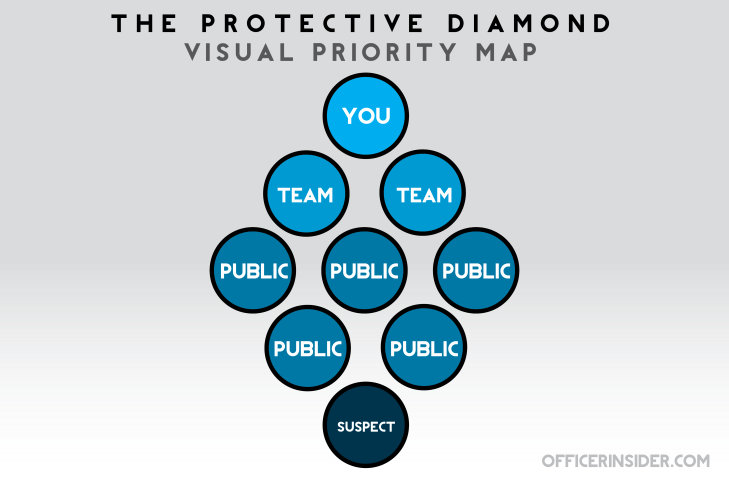This article probably isn’t going to go the way you expect it to. In fact, this article isn’t aimed at bashing thugs at all– it just points out some of the things they share in common with each other. This article is about you, your role in security work, and where you might fall short.
Our shortcomings get us in trouble. If you’re a thug, your shortcomings get you arrested. If you work security, your shortcomings can get you hurt in many more ways. You will always have more to lose than a thug. Therefore, it is in your best interest to always gain and maintain as much of an advantage over them as possible.
With that said, here’s three ways to avoid stooping to their level.
Dress

You want to embody the mentality “tactical and practical” when you dress for duty. So ask yourself honestly, do you?
Thugs like to wear over-sized clothing that makes it harder for them to run or fight. They choose garish colors that make them easy to spot, and wear impractical jewelry and other accessories to complement their lifestyle.
Don’t stoop to their level.
You might think this doesn’t apply to you, but I’ve yet to meet anyone in the security profession that truly has everything squared away, myself included (although I certainly strive to improve on a regular basis). Here’s a few of the more common items:
-
Impractical footwear:
- If you’re wearing a duty uniform, you need to wear duty boots. I recommend boots at least five inches high– your ankles will thank me.
- Tip: I love 5.11 and Bates side-zip boots. Don’t get steel toes– they’re impractically heavy if you walk a lot. Opt for a composite safety toe, which is lighter and offers some protection.
-
Sloppy garments
- One of my mentors taught me years ago: If it sticks out, bad guys will grab it. Tuck your shirt in. Pull your pants up. Button and zip it all closed. Don’t give your opponent convenient grappling handles. If something doesn’t fit in a pocket, get a pouch to hold it or forego it.
- Tip: Make a mental checklist of your uniform items and check through them regularly. Make it part of your routine– for instance, every time you finish a round of patrols.
-
Loose duty gear
- If it isn’t secured, it’ll go flying off when you need it most. Make sure the snaps on your pouches are secure. Replace worn-out velcro. Tighten the screws on friction-based or open-top holders. Inspect the loops on your pouches regularly for tears, fraying or signs of fatigue.
- Tip: Get a friend to stand in front of you and suddenly yank at something on your uniform. Does it come off within three seconds? If it does, reinforce it or remove it. Pens are a doozy– if you have pens sticking out of the top of your uniform pocket, you’re giving a close-quarters opponent a convenient stabbing implement.
Here’s a two-step test to see if you’re tactical and practical with your set up/dress:
Step 1: In your full set up right now, would you be willing to run through ankle-deep mud and hop over a fence? If the answer is yes, move on. Otherwise, replace/remove whatever it is you’re afraid to get damaged.
Step 2: If you were to do a back-roll and then a forward somersault, would anything fall off you or get damaged? If the answer is yes, remove or find a better way to secure those items.
Bonus: If you can’t do jumping jacks without gear loosening or flying off, you’re not doing it right.
Much of this is common sense– there are too many moving parts to cover in just one article. But thugs often have very little common sense. Take the easy advantage, unless you enjoy having damaged items and getting your personal gear ruined when you have to deal with an unexpected situation.
Intelligence

Thugs pride themselves on being stupid. They could be anything else if they wanted to be, but instead, they choose to be stupid because it’s easier. In fact, some actually take mind-altering substances that cause them to remain permanently stupid, as if being resistant to education and common sense weren’t enough to earn a blissful state of ignorance.
Don’t stoop to their level.
Performing your duties safely is all about establishing an advantage. This usually is a multitude of smaller advantages coming together to overwhelm a subject. For every bit of information you have, that is one piece of information your subject will have to match to stay ahead of you. Your drive for information determines your intelligence.
There is a marked difference between intelligence and education.
You can force yourself to sit through eight years of college and never actually learn anything. True intelligence requires that you pursue new information on a regular basis and successfully retain it.
Knowledge will keep you safe. So keep yourself up to date on as many diverse topics as you can– there is no such thing as useless information. The more you know about random things others may be interested in, the better you will be able to do your job. For instance:
-
You can control conversations easier and steer them towards neutral ground.
- Example: You’re talking to a suicidal subject, trying to keep him calm as authorities respond. He mentions he likes a certain hobby. The more you know about X hobby, the more likely you will be able to keep him calm until help arrives.
- Tip: Consider joining a local debate group or Toastmasters organization. Improve your communication skills so you can learn to relate to people better.
-
You can operate more effectively.
- Example: You learn bits and pieces of a foreign language. While on duty, you overhear two subjects speaking in that language, discussing a fight about to take place at your site. You can now take the proper measures to mitigate the event before it happens.
- Tip: Duolingo is a great, free way to learn a new language on-the-go.
-
Your investigative and response skills drastically improve.
- Example: You work at a site in a different city from where you live and you’re not very familiar with the place. You learn as much as you can about local events and gathering times. During an interview of a possible theft suspect, he states that he couldn’t have been responsible because he was at a nearby church for mass at the time. You ask if he has substance abuse problems and he says no. You happen to know the church he’s referring to has no service that evening and hosts AA meetings instead. You now know the subject is lying to you.
- Tip: If your site has any type of brochures, snap them up. You get great information from them. Free newspapers and periodicals distributed in the area? Grab them– and don’t just read the funnies section.
Personally, I find that the more I learn, the more personally satisfied I am with myself. If you don’t ever use any of the information you learn, know that it was still time well-spent. After all, you’re not a mystic– you can’t predict the future, so anything you learn today could be useful tomorrow.
Physical Fitness

Thugs are extremely stupid when it comes to physical fitness. They want to live a lifestyle in which they take what they want by force or deception and rely on physical evasion to enjoy the fruits of their labor. Yet much of their lifestyle is extremely counterproductive to this goal.
I love the mainstream rap music industry because they encourage a lifestyle that makes criminals easier to catch.
They purposefully weaken their bodies with alcohol, cigarettes and drugs. They further incapacitate their already-limited critical thinking skills through sleep deprivation and mindless media content. They rarely work out and fill their diets with junk food.
Don’t stoop to their level.
If you’re like me and your schedule is packed, it can be difficult to establish a regiment that keeps you fit. Instead, I personally rely on small steps that ultimately culminate in a better fitness condition. Here’s a few of those steps:
-
Quit smoking:
- I was a smoker for five years before I’d had enough of being constantly winded, the nicotine “sickness” you get when you smoke too much, the cravings, the high blood pressure. I know how hard it is, but just remember that for every cigarette you don’t smoke, some thug will smoke it for you and give you a bigger advantage if you have to chase or tussle with him.
- Tip: Quitting is tough– I know, I’ve been through it. But you’ll never succeed if you never try. And you should try it all– gum, mints, patches, whatever you can to kick the habit. It’ll be well worth it and could save your life (and others) in more ways than one.
-
Reduce your caloric intake:
- Food is fuel. Food has calories. Your body stores calories and if you use them, great. Otherwise, the extra unspent calories eventually turn into fat. Fat is hard to get rid of for most people. If you have a great metabolism and you regularly eat your own body weight in food and never gain a pound, good for you– you’re creating a bad habit that will eventually make you pay when you’re older and your metabolism slows down. You’ll end up being “that guy” that everyone looks at in a high school year book and goes “damn, he used to be so fit.” Prevention is key.
- Tip: Don’t eat out if you can help it– it’s bad for your wallet and your body. If you already pack a lunch, you’re ahead of the curve, but consider exactly what you’re packing. I prefer packing less than I think I’ll actually eat, and what I pack is usually healthy, and I’m no health nut. Yogurt, fruit, nuts, nutrition shakes are staples for me, and I didn’t always enjoy it. But like all things, you’ll eventually learn to.
-
Find opportunities to burn calories:
- You have to eat, because a hungry officer is an ineffective one. But how do you get rid of the calories you take in? The nature of security work often leaves us without time to actually hit the gym. If you can fit in a schedule, that’s great, but if not, what do you do to avoid getting flabby?
- Tip: Is your regular patrol route a quarter mile long? Double it, or do them twice as often. Take stairs whenever possible. Personally, I’m a big fan of Izumi Tabata‘s work– if you have even five or ten minutes to spare, and some simple home equipment, you can always squeeze in a work out. Search for workouts based on Tabata’s research and pick one you like– I started with this one three years ago. Whatever you pick, make sure you stick to it.
Conclusion
I hope you’ve found this piece helpful to you in your goals for self-improvement. There’s a lot we can learn about ourselves through security work– our commitment to physical fitness, societal impact, the pursuit of knowledge, all of these things are instrumental not only to the effective security personnel, they are also critical to being a productive human being in general.
There are countless more things I haven’t covered here that makes thugs stupid, but I hope this opens your eyes to your own shortcomings. I hope you view this as a challenge, no matter what point of life you’re at. Whether you’re 17 or 70 years old, you can always do better. Life isn’t fair, so we build and gain advantages to help tip the scales in our favor. What are you going to accomplish for yourself?
Until next time, stay safe out there.


